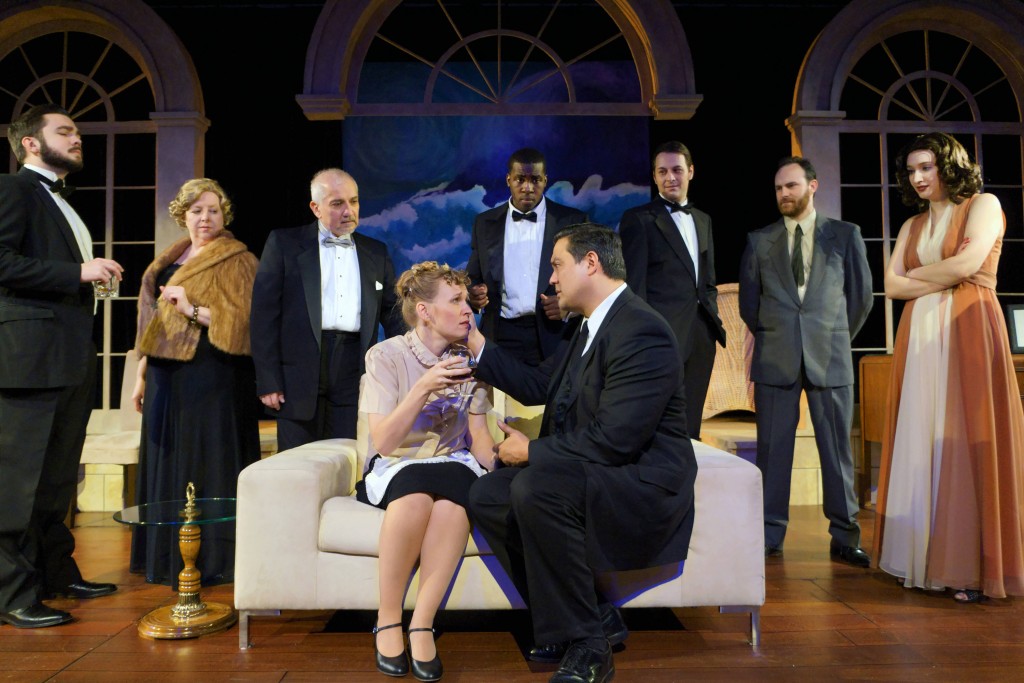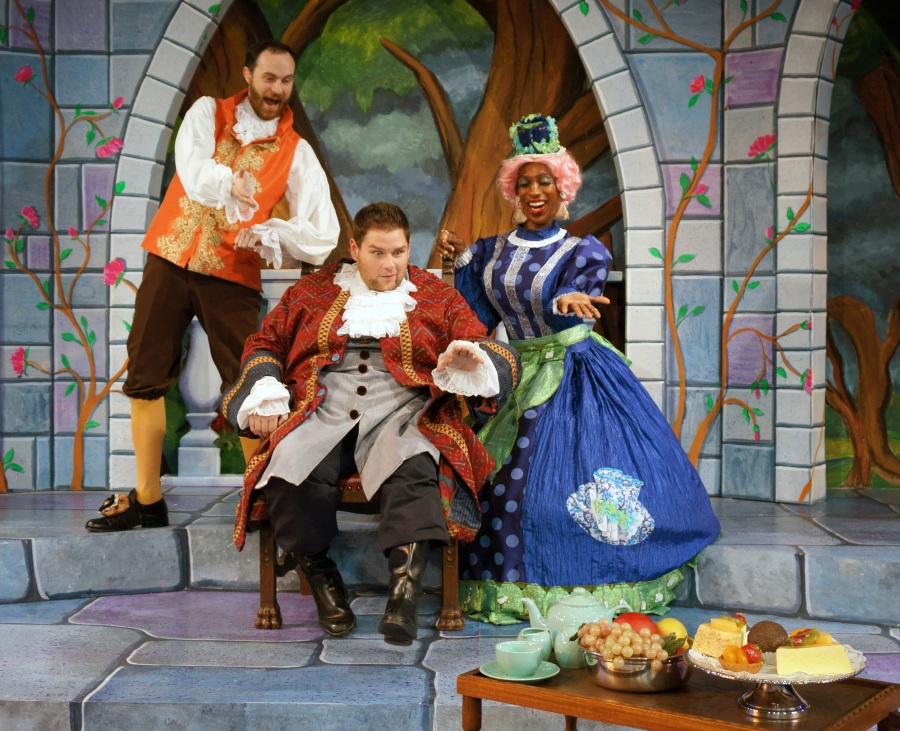PLANO, TEXAS: In the northeastern corner of the Lone Star State, about 20 miles northeast of Dallas, is the city of Plano, pop. 270,000. With an annual International Festival and its semi-offical status as the Hot Air Balloon Capital of Texas, Plano has plenty of entertainment on offer.
It’s also got culture: Theatre Britain, as its name advertises, has been bringing the town a trans-Atlantic flavor since 2010, when it relocated from Dallas. While Theatre Three and Dallas Children’s Theater are within 10 miles of Theatre Britain’s black box-style performance space, the nearly 20-year-old company has a unique niche: It programs works solely by British playwrights, with an emphasis on traditional British panto.
We spoke via email to president and treasurer Sue Birch about the history of panto, the inner workings of the company, and the scope of theatre in Texas.
Who founded Theatre Britain, when, and why?
Theatre Britain was the brainchild of Jackie Mellor-Guin. In the summer of 1996, she enlisted three other British women, including myself, with the aim of producing a traditional British panto. We all grew up with panto, which is the entertainment for families at holiday time in the U.K., and we were missing our yearly fix. A nonprofit partnership was formed, with Jackie and Pauline Bourqui as the principals and Lorna Woodford and myself as volunteers.
The mission was “to promote British theatre in its many and varied forms with particular emphasis on the unique medium of British pantomime (panto).” The first panto, The Sleeping Beauty, written by Jackie, was produced at the Plaza Theater in Carrollton, Texas in December 1996. The following year, Lorna moved on to other challenges. In 1998, Pauline left the group, Jackie moved to Los Angeles, I was concentrating on my acting career, and the company went dark until 2002, when I decided to produce The Mysterious Mr. Love by Karoline Leach. Our seasons have varied in size over the years, but we always have a panto written by Jackie. We incorporated in 2005 with Jackie as chair, myself as president and longtime friend (and original owner of the Plaza Theater) Steve Freedman. We now have an active board of eight. Between 2002 and 2009, we were resident at the KD Studio Theatre in Dallas. In 2010, we moved to the Cox Building Playhouse in Plano, Texas.
Tell us about yourself and your connection to your theatre.
I trained at the Oxford School of Drama and was a professional actor in the U.K. before I came to the U.S. in 1995 with my husband, who was posted here on an 18-month project. At that point, I was on a L2 visa (no work permitted), so I was only able to volunteer with Theatre Britain. Once I got my work permit and subsequently my green card, I was able to take on a formal role.
What sets your theatre apart from others in your region?
We are one of only a few companies in the U.S. producing panto, and we are the only panto in North Texas. We are also the only company in the region producing exclusively British work.
Who is your audience?
For the panto, people of all ages—families with kids as young as two. For our other shows, our audience is older. We typically pitch our non-panto shows for ages 12 and up.
Tell us about your favorite theatre institution other than your own, and why you admire it.
There is so much wonderful work being done in this area, which makes it very hard to pick out just one theatre. I do have a soft spot for Dallas Children’s Theatre which is a gem. I volunteered for them when I first came to Dallas, and have been in several shows there. Their productions and their education programs are first-rate. Not a theatre, but a local legend: Jac Alder, founder of Theatre Three, who recently passed away. A kind, generous, and supremely talented man who gave so much to our community. We will all miss him.

How do you pick the plays you put on your stage?
Well, we are restricted to British playwrights, so that narrows it down somewhat! All joking aside, we were pretty badly hit by the recession, and in the mid-2000s, we cut back to just the panto. Our move to Plano gave us the opportunity to build a new patron base, and we have slowly added shows to our seasons. We have produced some popular plays—And Then There Were None by Agatha Christie and Out Of Order by Ray Cooney, for example—in order to get people through the doors, and our audience is growing each year. As we go forward, we will be introducing our patrons to playwrights whose work they may not have seen before.
What’s your annual budget, and how many artists do you employ each season?
Our budget for 2015 is $179,000 and our 2016 projected budget is $230,000. In 2015, we will employ around 75 artists (actors, crew, designers) over four shows. In 2016 we will be producing five shows.
What show are you working on now? Anything else in your season that you’re especially looking forward to?
I am in preproduction for How the Other Half Loves by Alan Ayckbourn, which opens in September and I will direct. This is a show dear to my heart. I saw it in the U.K. several times and loved it, and I played in the Theatre Three production directed by Jac Alder in 2000. I am also looking forward to directing this year’s panto, King Arthur, with another original script by Jackie. As usual, there are some interesting challenges ahead, including a dragon who breathes smoke throughout the play, until the end, when it changes to fire!

Strangest or funniest thing you’ve ever seen (or put) on your stage?
In the early days of Theatre Britain, we toured the panto into elementary schools as well as having performances at the theatre. In panto, there is always a ghost scene. A ghost comes on and the audience can see it, but the characters can’t. We were doing The Sleeping Beauty in a gym and there were 600 children from pre-K up sitting on the floor. The actor playing the Prince was pretending not to see the ghost and kept asking the audience where it was. This frustrated a little girl in the front row so much that she leapt to her feet, rushed up to him, pointed her finger right in his face, and yelled, “It’s behind you,” emphasizing each word to make sure the actor got it!
What are you doing when you’re not doing theatre?
It feels like I only do theatre! When I get the chance, I enjoy reading murder mysteries and science fiction, and I love cryptic crosswords—my favorites are those in the Guardian. I am also a Big Sister with Big Brothers/Big Sisters. My little sister and I have been matched for eight years and it has been a joy.
What does theatre—not just your theatre, but the American or world theatre—look like in, say, 20 years?
The challenge will still be getting butts in seats, particularly ensuring that young people get the chance to experience live theatre. Whatever happens, that magical moment when the audience and the actors meet will always be with us. In 1994, I was working for Classworks Theatre in Cambridge , U.K. At the beginning of The Odyssey by Diane Redmond, there was a mock battle, and I rolled and came up right in front of this little boy. His eyes were shining and his face was one huge smile. I saw that same expression of sheer joy on the face of a patron this past weekend, a senior watching our Old Time Music Hall. This is why we do what we do, and it is why live theatre will endure, no matter what.


